

Too much ice also causes starvation. More polar bear catastrophe hype. Published on March 2, 2021 Written by Susan Crockford Last week (24 February 2021), The Guardian was promoting a study that claims polar bears now use four times more energy than expected to survive because of ‘major ice loss’ in the Arctic, as a way of suggesting that the animals are already on their way to extinction.
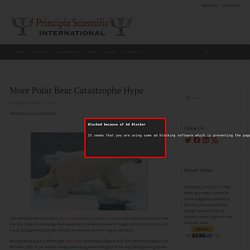
But like many papers of this type, this study by Anthony Pagano and Terri Williams (Pagano and Williams 2021) is yet another model describing what biologists think may be happening based on experimental data collected from individual bears, not a conclusion based on evidence collected from subpopulations with the worst amounts of ice loss. Polar bear science – past and present. A new book with unexpected good news about polar bears.
Summary: This is a fascinating book about science, about the making of public policy, about climate change, and above all – about nature.
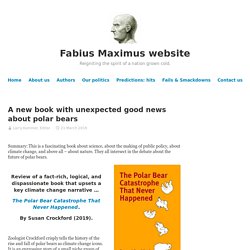
They all intersect in the debate about the future of polar bears. Review of a fact-rich, logical, and dispassionate book that upsets a key climate change narrative … The Polar Bear Catastrophe That Never Happened By Susan Crockford (2019). Zoologist Crockford crisply tells the history of the rise and fall of polar bears as climate change icons. “Researchers have learned a lot over the last two decades about bears’ ability to thrive in the Arctic and to take dramatic changes in that hostile environment in their stride – in particular changes in sea ice levels. “Stirling’s paper therefore came at just the right time. “It is a story of scientific hubris and of scientific failure, of researchers staking their careers on untested computer simulations and the attempts to obfuscate inconvenient facts.
Crockford tells a story of science’s weakness and strength.
Fake News about Polar Bears and Other Polar Animals. Rebounding Polar Bear Numbers. Polar Bears: Long-term History. 10 fallacies about Arctic sea ice & polar bear survival: teachers & parents take note. Reposted from Dr.

Susan Crockford’s Polar Bear Science Posted on July 12, 2019 | Summer sea ice loss is finally ramping up: first year is disappearing, as it has done every year since ice came to the Arctic millions of years ago. But critical misconceptions, fallacies, and disinformation abound regarding Arctic sea ice and polar bear survival. Ahead of Arctic Sea Ice Day (15 July), here are 10 fallacies that teachers and parents especially need to know about. The cartoon above was done by Josh: you can drop off the price of a beer (or more) for his efforts here. As always, please contact me if you would like to examine any of the references included in this post. Sea ice background: extent over the last year.
New Research: Polar Bears’ Seal Diet Hasn’t Changed…Their Body Condition Is Best After Sea Ice Breaks Up. The perspective that polar bears are endangered by global warming because reduced sea ice limits their seal-hunting opportunities is contradicted by observations of (a) polar bears thriving (body condition) during melt season, and (b) no trends in reduced seal consumption by polar bears in the 21st century.
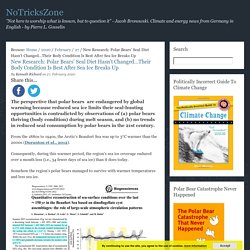
From the 1880s to 1940s, the Arctic’s Beaufort Sea was up to 3°C warmer than the 2000s (Durantou et al., 2012). Consequently, during this warmer period, the region’s sea ice coverage endured over a month less (i.e., 34 fewer days of sea ice) than it does today. Polar Bear Scientists May Be Hiding Good News. In State of the Polar Bear Report 2019, published by the Global Warming Policy Foundation (GWPF) on International Polar Bear Day, Dr Susan Crockford explains publication of population counts for several Arctic regions have been long overdue.
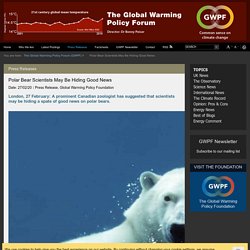
Data on the body condition of female bears and survival of cubs in Western Hudson Bay have not been published in over 25 years, despite claims that these are key measures of the impact of climate change on bears. According to Dr Crockford, this may well be because the data do not support claims of disaster for the bears. Winning: Climate Activists Ditch Polar Bear Icon As Growing Populations Defy 'Emergency' Narrative.
Polar bears are out, and pictures of people in misery after natural disasters and choking on smog are in.
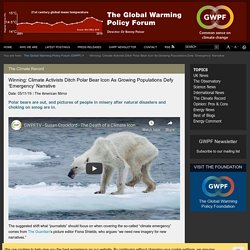
The suggested shift what “journalists” should focus on when covering the so-called “climate emergency” comes from The Guardian’s picture editor Fiona Shields, who argues “we need new imagery for new narratives.” There’s one other convenient benefit: Polar bears are thriving in the changing climate, an inconvenient truth that contradicts the doom-and-gloom narrative promoted by climate alarmists. Is the demise of polar bears being exaggerated to keep extinction panic alive? Reposted from Polar Bear Science Posted on July 25, 2020 | An excellent summary of recent points I’ve made in my latest book and on this blog about the recent push to keep polar bear extinction panic alive with a new model of impending doom was published two days ago in the Spectator UK by columnist Ross Clark (23 July 2020, in Coffee House).
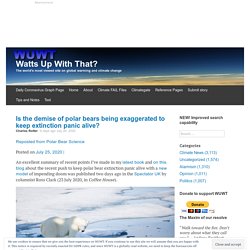
Excerpt below: “Wouldn’t it be nice if we could debate climate change for five minutes without hearing about polar bears or being subjected to footage of them perched precariously on a melting ice floe? But that is a little too much to expect. Read the whole thing here. PS. Mark Z. Jacobson: “oil, gas, and coal companies are killing many of the 22,000 remaining polar bears”… Guest Ayeuhhh????

By David Middleton Let’s identify the non sequitur first… The man who killed the polar bear, leaving it to rot for five months and then burning the carcass, did not work in the “climate wrecking” industry. Man charged in Alaska for killing a polar bear and burning the body after letting it rot for 5 monthsBy Allen Kim, CNNUpdated 2:27 PM ET, Fri July 12, 2019(CNN)A man in an Alaska village has been charged with federal crimes for allegedly killing a polar bear and leaving it to rot for five months. Christopher Gordon of Kaktovik is accused of violating the Marine Mammal Protection Act after he allegedly shot and killed a polar bear around December 20, 2018.[…] Katkovik, with about 250 residents, is some 640 miles north of Anchorage.Officials say Gordon improperly stored whale meat in his front yard, which attracted the polar bear.
The funny thing is that he wouldn’t have broken the law if he ate the bear. Bogus Greenpeace claim that lost Russian polar bear is evidence of climate change. Reposted from Polar Bear Science Posted on April 18, 2019 | Comments Off on Bogus Greenpeace claim that lost Russian polar bear is evidence of climate change Another day, another bogus starving polar bear claim from an environmental organization.
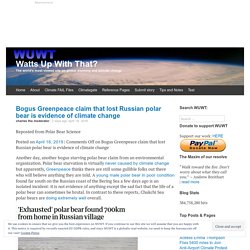
State Of The Polar Bear Report 2018. Unfounded concern for polar bears from onshore oil exploration in Alaska. Canadian biologist Andrew Derocher was called upon to promote his particularly pessimistic viewpoint on polar bear survival in a story published in the New York Times yesterday (2 December 2018: “Drilling in the Arctic: Questions for a Polar Bear Expert”).
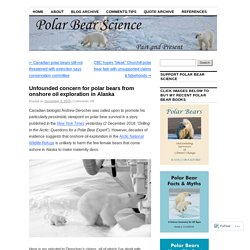
However, decades of evidence suggests that onshore oil exploration in the Arctic National Wildlife Refuge is unlikely to harm the few female bears that come ashore in Alaska to make maternity dens. Here is my rebuttal to Derocher’s claims, all of which I’ve dealt with previously. 1) Quote: Southern Beaufort bears show “very clear effects climate change and the reduction in Arctic sea ice”. The Southern Beaufort Sea has unique sea ice characteristics that make it inappropriate for comparison to any other Arctic region: what happens to SB polar bears is not comparable to other populations. 2) Claim: sea ice loss will eventually harm polar bears. 3) Claim: For the Arctic, sea ice is like the soil in the forest.
References. Flashback: The Politics of Polar Bears CBC documentary (2014) Published on February 21, 2020 Written by Susan J Crockford PhD Worth watching if you haven’t seen it – and a second look if you have – a rare balanced documentary produced by the CBC in 2014 on polar bear conservation, with interviews with biologists Mitch Taylor and Andrew Derocher. “In The Politics of Polar Bears, Reg Sherren will pick his way through the message track to help you decide what is really happening with the largest land carnivore on the planet.” Short version here (about 18 minutes): Entire version (45:30): CBC hypes “bleak” Churchill polar bear fate with unsupported claims & falsehoods. Over the weekend in Canada, the CBC ran a polar bear news feature that is now available online (“Polar bears in peril: the bleak future of Churchill bears,” The National, CBC, 3 December 2018).
It gave polar bear biologist Nick Lunn of Environment Canada free rein to spread unsubstantiated claims and outright falsehoods about the status of Western Hudson Bay polar bears and sea ice. Apparently, he and the CBC learned nothing from National Geographic‘s fiasco over their ‘starving’ polar bear video last year: they still think the public will be swayed to “act” on human-caused global warming if a persuasive expert tells them that polar bears are on their way to extinction. I expect many were convinced otherwise, since the facts are available for all to see. No triplet litters born since 1996? Nonsense, as the photo below (from 2017) shows. Polar Bears Prefer Dining At The Dump.
BBC One Planet - Polar Bears. Facebook Censorship of PragerU Polarbear Video. Amstrup Is Lying To The Media About Crockford’s Demolition Of His 2007 Polar Bear Paper. By Paul Homewood Susan Crockford has responded forcefully to the latest disinformation to come from Steve Amstrup and co: Until now, my scientific paper post at PeerJ Preprints for review, about the failure of Steve Amstrup’s 2007 USGS polar bear survival model (Crockford 2017), has been formally ignored by Amstrup and his colleagues. But now Amstrup and his colleagues have taken to lying to the media about my analysis because he can’t refute it in a scholarly manner. Amstrup was quoted by Erica Goode in her New York Times article on the Harvey et al. (2018) BioScience attack paper published Tuesday (10 April 2018: “Climate Change Denialists Say Polar Bears Are Fine. Scientists Are Pushing Back”): “Dr. And over at the online outlet Mashable (11 April 2018: “Climate scientists fight false polar bear narrative pushed by bloggers”), reporter Mark Kaufman quoted Jeff Harvey, lead author of the BioScience paper on the issue, although Harvey is hardly an authority:
Exile for non-believers. An original paper for the Science and Public Policy Institute (SPPI) Source: PDF Report The price for speaking out against global warming is exile from your peers, even if you are at the top of your field. What follows is an example of a scientific group that not only stopped a leading researcher from attending a meeting, but then—without discussing the evidence—applauds the IPCC and recommends urgent policies to reduce greenhouse gases. Scientist who said polar bears were drowning investigated for 'scientific misconduct' 29 Jul 11 - The scientist who claimed polar bears were drowning because of melting ice caps has been placed on administrative leave as officials investigate scientific misconduct allegations.
Although it is unclear what the allegations are, a US government watchdog group representing Monnett says investigators are focused on observations of bears he and researcher Jeffrey Gleason made in 2004. Just five years ago, Dr Charles Monnett, a federal wildlife biologist working in Alaska, stunned the world after spotting four polar bear bodies floating in the sea miles from shore.
Monnett and Gleason detailed their observations in an article published two years later in the journal Polar Biology, suggesting the increased incidence of storms caused by global warming, and the loss of ice for polar bears to walk on, could lead to more deaths in the future. The article helped galvanize the global warming movement.. Coke’s WWF cash machine. White Coke Cans Fund Polar Bear Myths. Polar bears ‘running out of food’ Activist biologist filled with eco-anxiety shares unfounded fear of polar bear catastrophe. Misplaced eco-anxiety that kids have about polar bears starts with activist biologists like Steven Amstrup, spokesperson for an organization devoted to raising climate change alarm – and media outlets like The Guardian who help them spread fears unsupported by scientific evidence. Polar bear alarmists double-down on message of future starving bears. It seems thicker sea ice in the region was the cause, but they ignore that fact. Polar bears keep thriving even as global warming alarmists keep pretending they’re dying.
One powerful polar bear fact is slowly rising above the message of looming catastrophe repeated endlessly by the media: More than 15,000 polar bears have not disappeared since 2005. Although the extent of the summer sea ice after 2006 dropped abruptly to levels not expected until 2050, the predicted 67-per-cent decline in polar bear numbers simply didn’t happen. Rather, global polar bear numbers have been stable or slightly improved. The polar bear’s resilience should have meant the end of its use as a cherished icon of global warming doom, but it didn’t. The alarmism is not going away without a struggle. Sea ice silly season: Wadhams spouts fake facts about polar bears of northern Greenland.
Study: Predictions of polar bear extinction based on bad science. Predictions that global warming would wipe out polar bears are based on “scientifically unsound” computer models, according to a new study by a veteran zoologist at the University of Victoria. As Polar Bear Populations Fail To Decline, Message Of Doom Intensifies. Polar Bears Survived Periods When The Arctic Had No Ice. Eemian excuses: the warm was different then, polar bears were fine. Biological response to climate change in the Arctic Ocean: the view from the past. Zoologist: U.S. Polar bear Survival Plan is 'fake news' - Principia Scientific International. Most Polar Bears Live In Canada, Where There Has Been No Net Warming For Centuries. So Why Are They Endangered?
It’s official! You can stop worrying about “climate change” effects on the polar bears, seals, and walrus – they’ve seen it all before, including ice-free summers. Has recent summer sea ice loss caused polar bear populations to crash? One-sided science ignores the fact that ‘Sea ice is not a stable habitat for polar bears’ Polar bears out on the sea ice eat few seals in summer and early fall. An inconvenient truth. No Temporal Decline in the Foxe Basin Polar Bear Population of Canada.